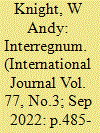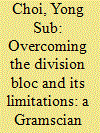| Srl | Item |
| 1 |
ID:
189853


|
|
|
|
|
| Summary/Abstract |
The war in Ukraine is the culmination of the geo-economic and geopolitical
struggle of the so-called Rest (non-Western countries) for political and
civilizational divergence from the global universalization promoted by
the collective West. It will have profound and long-term global political,
economic, and institutional consequences for the New International Order.
This paper argues that the Grand Split that is taking place today is, in fact,
a non-peaceful breakdown of the current West-led international rules-based
order. This is a war with the collective West that is taking place in Ukraine
with differentiated support of some countries from the Rest. Ukraine is thus
the epicenter of a larger conflict.
|
|
|
|
|
|
|
|
|
|
|
|
|
|
|
|
| 2 |
ID:
189884


|
|
|
|
|
| Summary/Abstract |
There is a crisis of global governance at this moment in our history -- a moment being labeled as 'the interregnum -- a moment of transition from one world order to another. The turbulence and disequilibrium of this moment in our history have triggered intense and growing interest in the concept and practice of governance at all levels. This is not a reflexive moment; it is a time for serious reflection and contemplation; a time for reconceptualizing ‘global governance’; an auspicious moment for constructing a new global governance paradigm. To assist in this introspective exercise, it may be important to shift from 'problem-solving' theorizing to a 'critical theory' approach that stands outside prevailing understandings of what global governance has come to mean and discard the oversimplified state-centric vision of world order; replacing it with the more nuanced 'summative' global governance - a concept that is more sophisticated and flexible than previous ones and may provide the needed space and time for us to transform the practice of global governance.
|
|
|
|
|
|
|
|
|
|
|
|
|
|
|
|
| 3 |
ID:
174561


|
|
|
|
|
| Summary/Abstract |
Colonialism affects post-colonial social formations in a variety of ways. Japanese colonial rule had a far-reaching influence on South Korean post-colonial social formation. Most legacies of colonialism diminished as time went by, but one legacy of colonialism continued or even increased its effects on the South Korean political economy from the 1960s – namely, the division of Korea. This article provides an alternative Gramscian approach to the analysis of the social formation of South Korea, with due consideration of the division of the peninsula. For that purpose, it introduces the concept of a division bloc, adapting Gramsci’s concept of a historical bloc to develop an analysis of a social formation that is unique to South Korea. Then, I explicate the two events that have been most damaging for the division bloc – the 1997 economic crisis and the 1998–2007 inter-Korean reconciliation – describing them as an organic crisis and a hegemonic project, respectively. Following this, I present reasons why the counter-hegemonic efforts of liberal nationalists to overcome the division bloc failed.
|
|
|
|
|
|
|
|
|
|
|
|
|
|
|
|